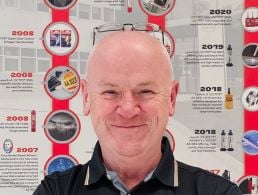When we hear the media talking about the tech sector and its workforce, it can feel like a faceless mass of people glued to their computers. In truth, it is far more varied than that.
David Stapleton, lead enterprise architect at PwC, tells us about his background and his experience working in tech.
What drew you to this career area?
I studied computer applications in Dublin City University, so I always had an interest in information technology.
Over the past 20 years, I have been working in the UK, mainly based in Edinburgh and working on IT projects in financial services. In 2016, however, I felt the time was right to move back to Ireland with my family. This was for personal reasons, as well as the uncertainty that comes with Brexit and possible Scottish independence.
While in the UK, I worked with a few of the Big Four, but I was most impressed with PwC. When the decision was made to move back to Ireland, I started discussions with PwC. Once I was made aware of the company’s plans for growth in advisory, it was an easy decision for me to make.
What’s the best thing about working in tech?
As an enterprise architect, you tend to deal with clients at the C-level, as well as senior management. This usually means that you spend less time immersing yourself in technology, but you need to be able to convey how technology can help drive the business vision.
With many years of IT change and implementation experience, I find it very satisfying to be able to relate my experiences to the challenges that face our clients.
What’s the most exciting development you’ve witnessed in this sector since you started working in it?
My work in PwC is not industry specific, but I think fintech is very interesting. In Ireland, it provides a great opportunity for challenger banks to enter the market, especially where they do not have the legacy systems that traditional banks have. That makes them more agile and responsive to customer demands. Watch this space for the innovation that PSD2 brings.
I also see smart metering as an interesting area in Ireland. It is very powerful to be able to give homeowners the possibility of automatically responding to fluctuating energy prices. Learning how we can leverage this technology to change consumer behaviour in the way we use energy is vital.
What aspect of your job have you struggled to get to grips with?
Having worked predominantly in the UK for the past two decades, it is a huge change being back in Ireland – it has changed so much in the period I have been away. I am constantly bumping into old colleagues and meeting new clients. It’s a case of so many opportunities, but so little time.
I also find the pace of change that we are now experiencing is unprecedented, and our attitude towards embracing new technology is light years from where it was in the recent past. It’s almost overwhelming.
My focus at PwC is to build an architecture team around our market offerings so that we can deliver to our clients the right technology solutions to meet their business needs. This is a challenge, given the buoyant job market in Dublin, as is getting candidates with the right mix of business acumen, experience and technology.
What’s been the hardest thing you’ve had to face in your career?
I have had many varied challenges throughout my career so far.
One of my first challenges was when I left school at the tender age of 17. I joined the Defence Forces as an army cadet and spent 18 months training in the Curragh Camp with 30 other teenagers. Going from a secure and comfortable environment at home to one where you were subject to mental and physical challenges was difficult. However, you realise very quickly that it’s the same for everybody and, once you work together as a team and support each other, you have a better chance of success.
If you had the power to change anything within the STEM sector, what would that be?
STEM skills are widely seen as critical to key areas of future growth and employment. In our schools, there is a need for further development of high-quality provision of STEM learning. Our curricula should focus on STEM skills. Policymakers should look at refocusing the school curriculum and the way we teach our children STEM skills.
Which of your personality traits makes you best suited to your job at PwC, and to this sector?
I tend to be conscientious as I like to be organised, and I prefer to be prepared rather than be spontaneous. However, this needs to be balanced with a degree of flexibility and being able to separate the wheat from the chaff.
Is there something in your personal life that helps you in your job?
Being a husband to a fantastic wife, and a father of three gorgeous young children, gives you a different perspective in life and reminds you to value the time you have with your family. It also teaches you to put things into perspective. My father always told me that life was not a rehearsal and to treasure what I have.
How do you make connections with others in the STEM community?
Having just returned to Ireland recently, I have signed up to the Irish Computer Society. I also use LinkedIn. I plan to investigate other social media or STEM-specific forums.
Has mentorship or coaching been important in your career?
One of my reasons for joining PwC – and for leaving IT contracting/self-employment behind – was to be able to provide coaching, and to be coached by others.
I see performance coaching and development as an essential part of making you a better individual. It provides you with rounded technical, industry and business development skills, and helps you to continuously enhance and grow these skills through on-the-job learning and relevant research.
What advice would you give to someone thinking about a career in this area?
We have all heard and read about digital disruption and how it is already transforming our lives and the way we do business. IT professionals have to be ready to adapt. IT is prevalent across every industry sector, and there are massive opportunities for those companies that can adapt to change and listen to their customers.
Furthermore, Ireland has become one of the world’s main innovation hubs. There are lots of options for IT professionals, and my advice would be to look to those companies that provide you with the type of working environment and culture that you are comfortable with.
You should also satisfy yourself that they can demonstrate that they are interested in developing you and can show you a clear career progression path.
Looking for jobs in tech or science? Check out our Employer Profiles for information on companies hiring right now and sign up for our Career Republic e-zine for a weekly digest of sci-tech careers news and advice.




